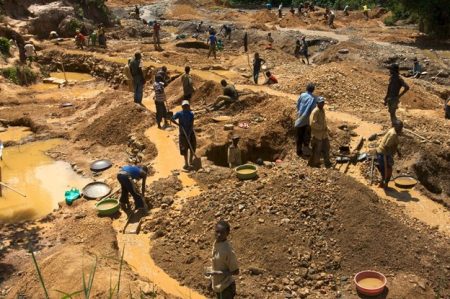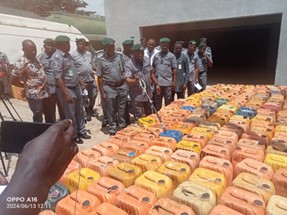—Says Bill will cost nation $3bn annually
Oscarline Onwuemenyi
19 August, 2011, Sweetcrude, ABUJA – The Chairman of the National Stakeholders Working Group, NSWG, of the Nigeria Extractive Industries Transparency Initiative (NEITI), Professor Assisi Asobie, has sought a hearing with the Senate to explain the Initiative’s position over the controversial Petroleum Industry Bill, PIB, currently before the National Assembly.
NEITI has picked holes in the Bill which is currently before the National Assembly, alleging a plot to rip the country off by unpatriotic elements in the nation’s oil and gas industry, if the bill passes in its current state.
According to sources within the anti-graft agency, the Chairman of NEITI, Prof. Assisi Asobie, is angling for an opportunity for a showdown with the protagonists of the said Bill, even as the agency has launched a massive campaign to discredit the controversial bill.
A statement from NEITI, which was made available to our correspondent in Abuja last week, raised the alarm of a possible loss of over $3 billion annually through inappropriate and unfavourable adjustments to the fiscal provisions.
It noted that in view of the fact that oil is the mainstay of the Nigerian economy, “the National Assembly owes all Nigerians a responsibility to promote Nigeria’s interest in the bill, protect our corporate sovereignty and secure the future of generations yet unborn.
“The Report of the PIB now before the NASS, if passed into law, will do havoc to Nigeria’s national interest.”
NEITI officials said they are prepared to appear before the National Assembly (in either one or both Chambers of the national legislature) to marshal empirical data and logical argument to validate the fact that in addition to the loss of revenue, passage of the PIB as currently proposed will “eliminate most functions of the relevant government agencies with respect to the Nigerian Hydrocarbon revenue flows thereby reducing the potentials for efficient operations of the Oil and Gas Industry and hinder revenue collection.”
It added that the bill would “Impede improvement in transparent management of revenue from the petroleum sector, as well as result in misalignment and conflict or roles and functions of the institutions and agencies.
“Fail to create the strong midstream agency required to ensure that cheap Nigerian gas is amply available for power generation and domestic consumption for economic growth. Instead it subsidises export at the detriment of National Development.”
“NEITI is making this urgent call for protection and defense of the national interest in – the on-going deliberations on the PIB by the NASS because it appears that some crucial facts and data were either not made available to members of the NASS or if made available, were not thoroughly understood and their import adequately appreciated by them to enable them make informed decisions on the PIB.
“This is especially so in respect of the impact and implications of the fiscal regime embedded in the document currently before the NASS, on revenue flows to the Federation Account as well as the criticality of a specific reference to the NEITI Act 2007 in section 5 of the PIB.”
NEITI does not see “the rationale for passing a Bill that is designed to reduce government revenue from petroleum operations by a minimum of $3bn annually through inappropriate and unfavourable adjustments to the fiscal provisions.”
“As an agency set up to, among other things, develop a framework for transparency and accountability in the Nigerian extractive industries, and to ensure conformity with the principles of EITI, NEITI has a stake and a legitimate interest in the Petroleum Industry Bill (PIB).
“NEITI therefore wishes to use this opportunity to strongly advise the NASS to ensure that, in its consideration of the Petroleum Industry Bill, nothing but Nigeria’s overriding national interest (optimization of revenue flows to Nigeria, protection of the operational environment, transparency, accountability and inter-generational equity) is held supreme. NEITI has reason to believe that some of these values are in danger of being sacrificed.”
NEITI pointed out that the House of Representatives Report establishes fiscal terms with a government share of oil revenues below internationally competitive levels and with a structure that will result in a rapid erosion of government petroleum revenues during the next 5 years.
According to NEITI, current rates of Nigerian Government share of Revenues are: PSC 48% JV 82%.
International rates of Government share of Oil revenue are: Minimum of 56% and Max of 90%. The House of Representatives’ Report proposal provides as follows: Max 45% for PSC and 60% for JV. This translates to a loss of about $3bn annually. This is dangerous to our already fragile economy that is oil –revenue dependent.
Similarly, the Senate Committee report provisions on fiscal regime will have the effect of reducing Government revenue from the sector during the next five years as production increases. The picture for revenue flow to Nigeria from royalty, profit oil, etc will be as follows: Current terms-US$5.9billion; PIB terms, as presented by the Federal Government, during public hearing in 2009-US$9.3 billion; Senate terms-US$5.8billion.
“NEITI is, therefore, of the view that if the NASS passes the Bill as it is now, the Nigerian Oil and Gas sector will be in serious danger of not achieving the desired national goals of promoting greater indigenous participation and increased revenue generation for national development.
“Above all, NEITI is shocked that the supporters of the bill, in its present form, do not see the deleterious implications of deleting Section 5 in the proposed bill, a section which clearly underscores the importance of transparency and good governance and which unequivocally makes it obligatory for all agencies, institutions, organizations and companies to operate according to the principles of transparency, accountability, anti-corruption and due process, as enshrined in the NEITI Act, 2007.”
It further stated that, “For the avoidance of doubt, NEITI is fully in support of passing the PIB; but it is strongly opposed to the content of the report being considered for passage at the NASS now, knowing that it is designed to bend the bill to serve foreign, rather than Nigeria’s national, interest.
“NEITI, therefore, hereby appeals to the NASS, to give NEITI an opportunity to give a full scale presentation to equip our law makers with comprehensive information that will assist them in contributing constructively to ensuring that the PIB, promotes the welfare of Nigerians and serves the interest of our dear nation.”




